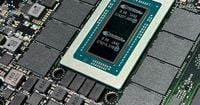The Trump administration is gearing up to overhaul the Biden-era restrictions on U.S.-made advanced AI chips, a move that could significantly reshape the landscape of global chip exports. Discussions are underway to replace the current tiered system, which was introduced by the U.S. Department of Commerce in January 2025 and is set to take effect on May 15, 2025. This existing framework, known as the Framework for Artificial Intelligence Diffusion, categorizes countries into three distinct groups: trusted allies like the European Union and Taiwan, Tier 2 countries with limited quotas, and restricted nations such as China, Russia, Iran, and North Korea.
According to sources familiar with the matter, the Trump administration is considering a shift towards a more streamlined global licensing regime based on government-to-government agreements. This approach aligns with Trump’s broader trade strategy of negotiating bilateral deals and potentially using U.S.-made chips as leverage in international relations. Such a change could simplify compliance for U.S. companies while enhancing the country's bargaining power in the global market.
One of the significant proposed changes includes tightening export thresholds. Under the current regulations, orders equivalent to 1,700 Nvidia H100 chips only require notification and not a license. However, the new proposal could reduce that threshold to around 500 chips, a move that has sparked debate among industry stakeholders.
Supporters of the proposed changes argue that they would bolster U.S. competitiveness and simplify enforcement. However, critics warn that dismantling the tiered system may complicate compliance and push countries toward cheaper, unregulated alternatives from China. Tech firms such as Oracle and Nvidia, along with various U.S. lawmakers, have expressed concerns that the current framework risks harming American competitiveness and could drive international buyers towards less expensive Chinese substitutes.
The U.S. Commerce Department has declined to comment on the ongoing discussions, leaving many in the tech industry speculating about the potential impact of these changes.
Meanwhile, Nvidia is adapting to the evolving landscape of chip exports. The company has reportedly begun redesigning its artificial intelligence chips to comply with U.S. export rules while still catering to its Chinese customers. According to a report by Reuters, Nvidia has communicated with major Chinese firms, including Alibaba Group, TikTok-parent ByteDance, and Tencent Holdings, about these adjustments.
Nvidia's CEO, Jensen Huang, informed customers about the company's plans during a trip to Beijing in mid-April 2025, shortly after the U.S. government imposed restrictions on the export of its H20 AI chips to China. These export limitations are projected to result in a staggering $5.5 billion in charges for Nvidia, highlighting the financial stakes involved in navigating the complex regulatory environment.
The company has assured its clients that a sample of the newly designed chip will be available as soon as June 2025. Additionally, Nvidia is still working on a China-specific version of its latest-generation AI chip, Blackwell, which aims to meet U.S. standards while serving the Chinese market.
This ongoing tug-of-war over chip exports underscores the broader geopolitical tensions between the U.S. and China, particularly in the realm of technology and artificial intelligence. U.S. officials have expressed concerns that unrestricted access to advanced chips could allow China to gain a competitive edge in AI, prompting tighter regulations on the flow of technology.
As the situation develops, the tech industry remains on high alert, watching closely how these regulatory changes will unfold and what they will mean for the future of AI innovation and international trade.
In a separate but related development, a tragic incident occurred at an Indian temple in Goa, where at least six people lost their lives and 55 others were injured in a stampede during a religious gathering. The incident highlights ongoing concerns about crowd safety in large public events, particularly in densely populated areas.
This tragic event serves as a reminder of the importance of safety measures in managing large crowds, especially during religious or cultural celebrations. As authorities investigate the circumstances surrounding the stampede, there will likely be calls for better crowd control and safety protocols to prevent such tragedies in the future.
In conclusion, as the Trump administration contemplates significant changes to AI chip export regulations, the tech industry and international markets are poised for a potential shift that could redefine global trade dynamics. At the same time, the tragic events in Goa underscore the need for vigilance and safety in public gatherings, reminding us of the human toll that can accompany large-scale events.

